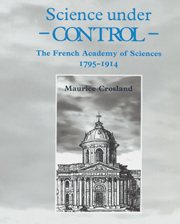Book contents
- Frontmatter
- Contents
- List of tables and figures
- Preface
- List of abbreviations
- INTRODUCTION
- 1 SCIENCE IN FRANCE
- 2 THE STRUCTURE OF THE ACADEMY
- 3 THE FUNCTIONING OF THE ACADEMY: SOME POSSIBLE ROLES
- 4 SCIENCE DIVIDED: THE SECTIONS
- 5 THE ACADEMICIANS
- 6 ELECTIONS: ‘GREEN FEVER’
- 7 REGISTRATION, JUDGEMENT AND REWARD
- 8 THE PRINTED WORD
- 9 AN ACADEMY UNDER GOVERNMENT CONTROL
- 10 ‘OUTSIDERS’: THE SCIENTIFIC FRINGE AND THE PUBLIC
- 11 THE INTERNATIONAL DIMENSION
- 12 THE CONTROL OF THE ACADEMY AND OF SCIENCE
- Name index
- Subject index
11 - THE INTERNATIONAL DIMENSION
Published online by Cambridge University Press: 09 October 2009
- Frontmatter
- Contents
- List of tables and figures
- Preface
- List of abbreviations
- INTRODUCTION
- 1 SCIENCE IN FRANCE
- 2 THE STRUCTURE OF THE ACADEMY
- 3 THE FUNCTIONING OF THE ACADEMY: SOME POSSIBLE ROLES
- 4 SCIENCE DIVIDED: THE SECTIONS
- 5 THE ACADEMICIANS
- 6 ELECTIONS: ‘GREEN FEVER’
- 7 REGISTRATION, JUDGEMENT AND REWARD
- 8 THE PRINTED WORD
- 9 AN ACADEMY UNDER GOVERNMENT CONTROL
- 10 ‘OUTSIDERS’: THE SCIENTIFIC FRINGE AND THE PUBLIC
- 11 THE INTERNATIONAL DIMENSION
- 12 THE CONTROL OF THE ACADEMY AND OF SCIENCE
- Name index
- Subject index
Summary
It is an accepted opinion [among some people] that the Academy constitutes the central point, to which all discoveries and inventions from the entire world converge as soon as they are made. These discoveries will take the trouble to come to us to verify their authenticity and it is only after being supplied with a passport, signed by us, that they can decently circulate in the republic of science.
(Victor Meunier, Scènes et types du monde savant, 1889, p. 214.)The title of associé étranger is reserved for those scientists who, from all countries except France and in all the sciences which the Academy studies, have reached the first rank. By this happy association the Academy is in a way universal, and the history of all the great discoveries, with which the sciences have been enriched since its foundation, belongs to its own history.
(Elie de Beaumont, éloge of Plana, 1872, M.A.I., 38, cvii.)I bequeathe to the Academy of Sciences the sum of 20,000f., the interest from which will be given every two years as the Delalande-Guérineau prize to the French explorer or scientist, who has rendered the greatest service to France or to science.
(Will of 1872, from Pierre Gauja, Les fondations de I'Académie des Sciences (1881–1915), Hendaye, 1917, p. 270.)Internationalism and nationalism
A certain universalism emerged in the eighteenth century from the ideas of the Enlightenment. The Enlightenment helped to spread the idea of man learning from nature. The natural world was thought of as providing models for law and politics, as for other human concerns.
- Type
- Chapter
- Information
- Science under ControlThe French Academy of Sciences 1795–1914, pp. 369 - 395Publisher: Cambridge University PressPrint publication year: 1992
- 1
- Cited by



